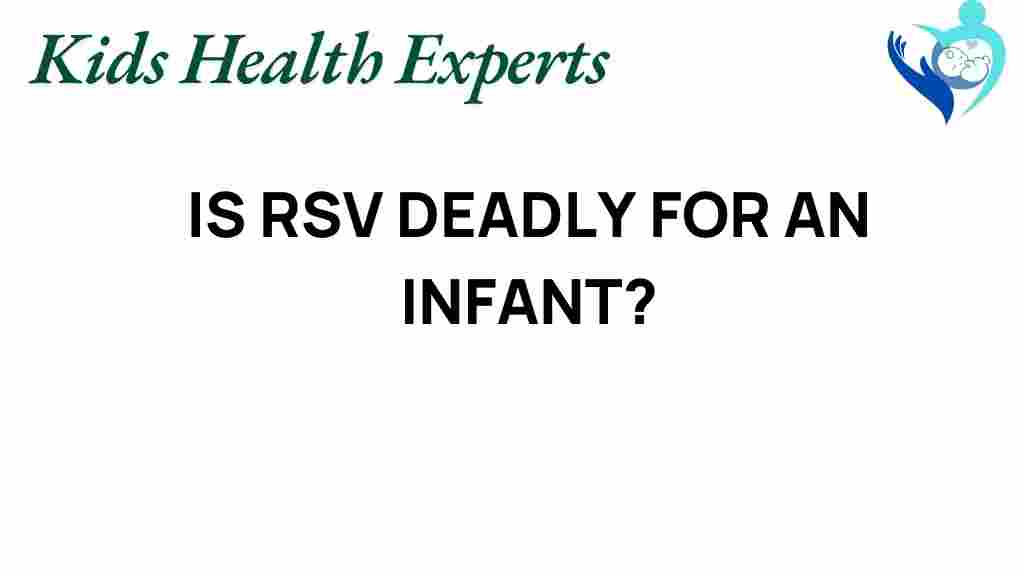The Hidden Dangers of RSV: What Every Parent Should Know
As the winter months approach, parents everywhere are bracing for the familiar onslaught of respiratory infections. Among these, Respiratory Syncytial Virus (RSV) poses a particularly significant risk to infant health. This common virus can lead to severe respiratory conditions, especially in young children and infants. Understanding the risks associated with RSV, its early symptoms, and effective prevention strategies is crucial for all parents. In this article, we will delve into the hidden dangers of RSV, provide essential parenting tips, and outline steps to ensure your child’s safety during the winter season.
Understanding RSV and Its Impact on Infant Health
RSV is a highly contagious virus that primarily affects the respiratory tract. It is the leading cause of lower respiratory infections in infants and young children, often resulting in hospitalization. Most children will contract RSV by the age of two, but not all cases lead to severe illness. However, for some infants—particularly those born prematurely or with underlying health conditions—RSV can be life-threatening.
Early Symptoms of RSV
Recognizing the early symptoms of RSV is vital for prompt intervention. The initial signs may resemble those of a common cold, which can lead to underestimating the virus’s severity. Common early symptoms of RSV include:
- Runny or stuffy nose
- Coughing
- Sneezing
- Fever
- Wheezing
- Decreased appetite
As the infection progresses, symptoms may worsen, leading to:
- Rapid breathing or difficulty breathing
- Blue color around the lips or face
- Extreme fatigue or lethargy
If you notice any of these severe symptoms, it is crucial to seek immediate healthcare attention.
Preventing RSV and Other Respiratory Infections
Prevention is key when it comes to protecting your child from RSV and other winter illnesses. Here are some effective strategies to reduce the risk:
- Practice good hygiene: Encourage frequent handwashing with soap and water, especially after diaper changes or before meals.
- Avoid close contact: Keep your baby away from sick individuals, especially during peak RSV season (typically fall and winter).
- Limit exposure to crowds: Avoid crowded places where the virus can easily spread.
- Keep surfaces clean: Disinfect toys, doorknobs, and other frequently touched surfaces to minimize the risk of infection.
- Use a humidifier: Keeping the air moist can help ease breathing for your infant if they do catch a respiratory infection.
In some cases, healthcare providers may recommend a preventive medication called palivizumab for high-risk infants, which can help reduce the risk of severe RSV disease.
Identifying Risk Factors for Severe RSV
Not all children are equally at risk for severe RSV infection. Factors that may increase the likelihood of severe illness include:
- Being born prematurely (especially before 29 weeks of gestation)
- Having a weakened immune system
- Living in crowded households
- Having underlying health conditions, such as congenital heart disease or chronic lung disease
Understanding these risk factors can help parents take additional precautions to protect their children during RSV season.
Parenting Tips for Managing RSV Symptoms
If your child exhibits symptoms of RSV, it is crucial to manage their comfort and health effectively. Here are some parenting tips to help:
- Monitor symptoms closely: Keep a close eye on your child’s breathing and overall condition. If symptoms worsen, contact your healthcare provider.
- Keep them hydrated: Ensure your child is drinking enough fluids, as staying hydrated is critical for recovery.
- Use a bulb syringe: A bulb syringe can help clear mucus from your infant’s nose, making it easier for them to breathe.
- Elevate their head: Slightly elevating your baby’s head while they sleep can help them breathe easier.
- Consult your doctor: If you are unsure about your child’s symptoms or how to manage them, do not hesitate to reach out to your healthcare provider for advice.
When to Seek Medical Attention
Knowing when to seek medical attention can be a lifesaver. Parents should be vigilant for the following signs that may indicate a need for urgent care:
- Your child has difficulty breathing or is breathing very quickly
- They are not drinking enough fluids, showing signs of dehydration
- They exhibit a bluish color around the lips or face
- They are unusually lethargic or unresponsive
- Coughing produces mucus that is green, yellow, or bloody
If you notice any of these symptoms, do not hesitate to seek immediate medical help. Early intervention can significantly improve outcomes for children with RSV.
Conclusion: Keeping Your Child Safe from RSV
As winter approaches, staying informed about RSV and its risks is essential for every parent. By understanding the early symptoms, taking proactive prevention strategies, and knowing when to seek healthcare, you can help ensure your child’s safety during this vulnerable time. Remember to practice good hygiene, keep your child away from sick individuals, and monitor their health closely.
For additional information on RSV prevention and infant health, you can visit the CDC’s RSV page. Stay vigilant and protect your child from the hidden dangers of RSV this winter.
By following the outlined parenting tips and strategies, you can help mitigate the impact of respiratory infections and keep your child safe. Remember, knowledge is power, and being prepared is the best way to ensure your child’s well-being during the colder months.
This article is in the category Conditions and created by KidsHealthExperts Team
